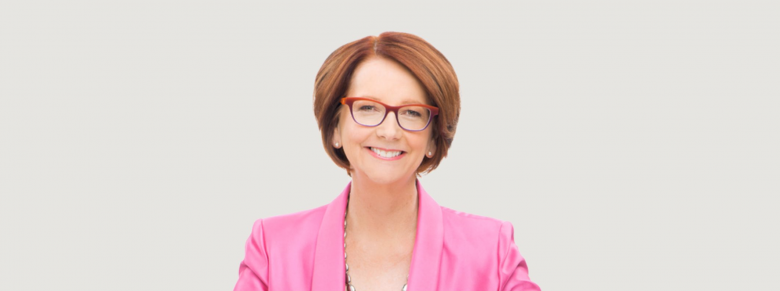Gillard, who will deliver the Baird Lecture at Elon's Spring Convocation on April 4, offers her take on a variety of topics in advance of her visit to the university.
 As prime minister of Australia, Julia Gillard helped her country navigate the global financial crisis, presented a vision for the role of Asia in the global economy and stood up against misogyny, most notably in a speech to the Australian Parliament that garnered worldwide attention.
As prime minister of Australia, Julia Gillard helped her country navigate the global financial crisis, presented a vision for the role of Asia in the global economy and stood up against misogyny, most notably in a speech to the Australian Parliament that garnered worldwide attention.
Gillard will visit Elon University on April 4 to be part of the university's Spring Convocation as she delivers the annual Baird Lecture, a talk titled "Engagement in the Asian Century: The Opportunity of Our Lifetime." More details about her visit and how to obtain tickets are available here.
In advance of her visit, the Elon University News Bureau reached out to Gillard for her thoughts on a variety of issues.
What do you believe is the biggest American misperception about Australia?
When I encourage my American friends to come and visit Australia, they often end up saying they are worried about crocodiles, sharks, snakes and spiders. So, I think the biggest misperception must be that Australia is a dangerous place. I can assure that biting and venomous creatures are not going to jump on you in our city streets and you can visit our outback safely.
On a more serious note, I think Americans tend to underestimate the diversity and sophistication of our economy. People are often shocked when I point out Australia’s third-biggest export industry is education.
Do you think Americans understand the significance of Asia within the global economy?
I think there is ever increasing understanding in the USA of the significance of China to the global economy. Less understood is the growth story of the entire region and the huge changes in other countries in Asia tend to get overlooked. For example, take Indonesia, a country of around 270 million people, which emerged as a democracy in 1999. I think that incredible story of growth and development is not well known by Americans.
What is a takeaway from your experience as prime minister you like to share most often when you speak?
One key takeaway is about how you make decisions well in today’s world of super-fast news and constant connectivity. Good government does not move at anything like the speed of the current news cycle. Good decision making takes time, a clear sense of purpose and tuning out the noise. During my time in office I understood that, and I tried to carve out time for quiet, deep thinking. The benefits of being disciplined about taking time out is a message I am always keen to share.
You gained worldwide attention for the "misogyny speech." Were you surprised that your strong stance against misogyny and sexism generated such a response?
I think the appropriate word is ‘astonished’ rather than surprised. I had absolutely no idea when I gave that speech that it would travel globally, go viral and still be talked about years later. However, from my many conversations with women about that speech, I have come to understand how it moved beyond the parliamentary moment and struck a chord with those who had suffered sexism and had dreamed of having the opportunity to give the same kind of speech in reply.
Do you believe progress is being made in how women in leadership are respected and supported? Globally, are we improving or declining in that area?
Progress is being made and that should be celebrated. But we still have much to do given the size of the challenge. Globally only 11 women serve as Heads of State and 10 serve as Heads of Government, out of the more than 190 nations on earth. Only 24 percent of national parliamentarians are women; only 9% of senior IT leaders; and only 15 percent of corporate board members.
Depressingly the World Economic Forum’s most recent gender study concluded that the economic and political gender gaps would not be closed for 202 and 107 years respectively.
That’s way too long to wait and we have to accelerate change.


